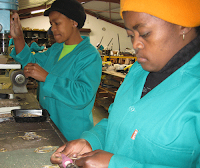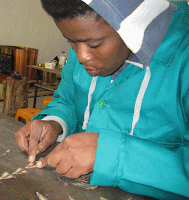Whether you source items from local artisans or those manufactured by large factories in China, the fact of the matter is that someone was responsible for making those items. And the question we should ask ourselves as retailers is: Are we hurting others in the process of merchandising our shops with beautiful items?
I first learned of fair trade almost a decade ago when I was working in the gift and home industry for a large trade show producer. I love the little shops that dot Main Street and was overwhelmed by the choices of tantalizing products awaiting retailers down every aisle and showroom. How could they choose, I asked myself?
 As I spoke with retailers and manufacturers, it became clear that prices, next to products, were very important to them. And in order to keep prices low, the cost of producing the products had to be as low as possible. Well, someone had to “pay the price” of keeping prices low and you can imagine who has to bear the brunt – those who toil to make the products.
As I spoke with retailers and manufacturers, it became clear that prices, next to products, were very important to them. And in order to keep prices low, the cost of producing the products had to be as low as possible. Well, someone had to “pay the price” of keeping prices low and you can imagine who has to bear the brunt – those who toil to make the products.Fair trade, at its very core, is about paying those who make the products a fair wage. It also means they are working in decent working conditions and do not employ sweatshop or child labor. This concept made so much sense to me – why would I ever want to sell (or wear or use something) when I knew another person had to suffer for me to have it?
 I launched World Shoppe as a way to offer beautiful and on-trend gifts and home accessories that were all handmade and fair trade to test my idea – Is there a market to support fair trade? Is there ever! World Shoppe quickly gained steam and within a few weeks of going live, I received a call from a national consumer fashion magazine editor who wanted to feature three of the items from the site in its holiday gift guide. Within two months I was shipping out hundreds of gifts and home accessories all over the country.
I launched World Shoppe as a way to offer beautiful and on-trend gifts and home accessories that were all handmade and fair trade to test my idea – Is there a market to support fair trade? Is there ever! World Shoppe quickly gained steam and within a few weeks of going live, I received a call from a national consumer fashion magazine editor who wanted to feature three of the items from the site in its holiday gift guide. Within two months I was shipping out hundreds of gifts and home accessories all over the country. Last year I had the opportunity to visit with artisans in South Africa where I was able to work one-on-one to create a beautiful collection of copper and brass jewelry. The designs are new to the United States and definitely not for the wallflowers. The necklaces are more statement pieces, the cuffs are to be noticed and the earrings will complement almost any outfit – day or night.
Last year I had the opportunity to visit with artisans in South Africa where I was able to work one-on-one to create a beautiful collection of copper and brass jewelry. The designs are new to the United States and definitely not for the wallflowers. The necklaces are more statement pieces, the cuffs are to be noticed and the earrings will complement almost any outfit – day or night. Within days of U.S. Customs releasing my shipment, I had my first retail customer who also offered to host a launch party for the new line. Within two weeks, I had three more. Are American consumers ready for fair trade? Absolutely.
Is fair trade easy? Not always, since you’re often working with developing countries strife with political or other type of turmoil. Postal office strikes, lack of road access, not properly marking products with country of origin and having your packages held up at U.S. Customs are all very real issues that affect packages coming into the United States. Nonetheless, the rewards of positively affecting another person’s life is what motivates me daily.
 So next time you’re eyeing some new gifts or home accents for your shop, take a moment to ask another critical question after you ask about the prices or minimums – how is the product made? While no one will tell you the item has been created using sweatshop or child labor, the answers may surprise you – positively or negatively.
So next time you’re eyeing some new gifts or home accents for your shop, take a moment to ask another critical question after you ask about the prices or minimums – how is the product made? While no one will tell you the item has been created using sweatshop or child labor, the answers may surprise you – positively or negatively. For a list of organizations currently wholesaling fair trade gifts and home accessories, visit the Fair Trade Federation. The non-profit also lists organizations exhibiting at various gift and home trade shows throughout the country, making it ways to find, and source, socially-responsible merchandise for your shops!
Megy Karydes is founder of World Shoppe), a fair trade retailer and wholesaler of handmade jewelry from South Africa. You can contact her at megy [at] World-Shoppe [dot] com

No comments:
Post a Comment